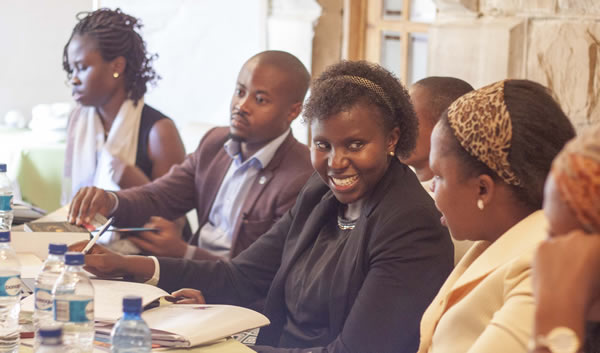Posted on May 11, 2017
In view of strengthening the mandate of the Special Rapporteur on the Rights of Women in Africa (SRRWA), the Gender Unit of the Centre for Human Rights (CHR) organised a three-day refresher workshop on increasing states capacity for reporting under the Protocol to the African Charter on Human and Peoples’ Rights on the Rights of Women in Africa (the Maputo Protocol) in the Kingdom of Lesotho. The workshop was held in collaboration with the Ministry of Law and Constitutional Affairs.
The workshop was held from 10 to the 12 April 2017 at the Lancers Inn conference hall in Maseru. Ten key government and civil society stakeholders involved in the state reporting process in Lesotho attended this workshop.
The main objectives of the workshop were to disseminate and popularize the Guidelines on State Reporting on the Maputo Protocol; to build and strengthen the capacity of the key stakeholders in on state reporting under the Maputo Protocol. In addition, to ensure that the government of Lesotho complies with its state reporting obligations under the African Charter (Part A) and particularly the Maputo Protocol (Part B). In pursuant of this goal, the CHR had provided a technical assistant to assist the country (for a period of 10 months) in the production of its report.
The Technical Assistant has been placed in the Ministry of Law and Constitutional Affairs in Lesotho. Some of the functions of the technical assistant include, assisting in steering the reporting process by providing the reporting guidelines, connecting relevant ministries and general assistance to the Ministry tasked with the preparation, drafting and submission of the report etc. As such, the workshop was also a useful platform for the technical assistant deployed to interact with the relevant stakeholders in the country.
The Principal Secretary of the Ministry of Law and Constitutional Affairs in his opening remarks at the start of the workshop highlighted reasons for the country’s failure to submit state party reports on time. The reasons advanced include; the lack of human, technical and financial resources to undertake the reporting process. However, he committed to ensuring that the Kingdom of Lesotho submits a report on Part A and particularly on Part B (Maputo Protocol) to the African Commission on Human and Peoples’ Rights (African Commission) as soon as possible.
Part of the workshop’s proceedings included presentations on the African human rights system specifically the African Charter on Human and Peoples’ Rights (African Charter) and the Maputo Protocol; the introduction and background to the Maputo Protocol; an overview of the substantive provisions of the Maputo Protocol etc. A representative from the Ministry of Gender in Lesotho also gave a presentation the situation of women’s human rights highlighting progress and challenges in the country.
The workshop was highly interactive and participatory. Participants and facilitators had useful discussions on certain provisions of the Maputo Protocol. Discussions ranged from whether bohali (Lobola)increases the prevalence of gender based violence in the country. There were also interactive discussions on cultural practices in Lesotho such as Chibeliso and general impact on the rights of women in the kingdom.

Participants at the workshop on increasing states capacity for reporting under the
Protocol to the African Charter on Human and Peoples’ Rights on the Rights of Women in Africa (the Maputo Protocol) in the Kingdom of Lesotho
After sharing the status of reporting and the challenges faced by those tasked with state reporting in Lesotho, participants worked in thematic groups to draft a report on the Maputo Protocol and then presented it in a moot session of the African Commission. This session provided an opportunity for the representatives to have constructive engagement with the African Commission’s workings and procedures.
An important outcome of the workshop was participants' expressed commitment and willingness to continue the process of working with the technical assistant to compile, draft and follow the guidelines with a view to submitting Lesotho's report on the African Charter (Part A) and Part B on the Maputo Protocol at next year's session of the African commission.
Copyright © University of Pretoria 2024. All rights reserved.
Get Social With Us
Download the UP Mobile App